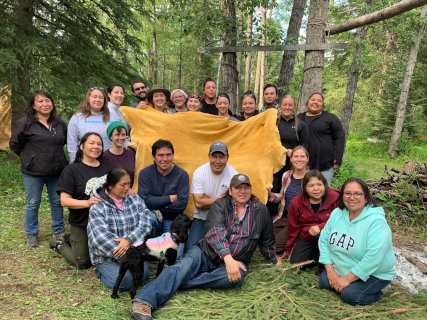Prof. Hadley Friedland receives a 2023 Killam Accelerator Research Award
Kalina Broda - 09 March 2023

Indigenous communities lie at the heart of Associate Professor Hadley Friedland’s legal research at the University of Alberta Faculty of Law.
“It’s the communities’ work — I just support it,” she says. “The biggest honour is having them trust me.”
Friedland’s dedication to the revitalization of Indigenous law through community-led research has merited her a 2023 Killam Accelerator Research Award, which provides promising early-career faculty members with targeted investment to advance their research over a three-year period.
“What’s most meaningful to me is seeing community-led and Indigenous law research being recognized and valued,” says Friedland.
Though still early in her career, her work tenacity and research is being celebrated across the Faculty of Law.
“The legal work that Professor Friedland does in the faculty, I consider to be, the most exciting and relevant legal work on the planet right now,” says Professor Ubaka Ogbogu, the Faculty’s associate dean of research. “I’m pleased that the panel adjudicating the Killam recognized the need to continue supporting this very important work.”
“Professor Friedland is widely known as a leader in her field,” says Dean Barbara Billingsley. “We’re very pleased to see her research and work with Indigenous communities recognized and supported by this prestigious award.”
Friedland has been a professor at the Faculty since 2017 and has worked extensively with Indigenous communities across Canada to develop methods that help identify and articulate their own laws. Her passion lies in creating accessible legal resources for communities to use.
“I’m not an expert in Indigenous laws — that’s for Indigenous Peoples,” she says. “My expertise lies in developing methods to help communities meet their Indigenous law goals.”
A resource she’s particularly proud of — and communities have found most helpful — is A Community Guide to C-92, a short video that she co-developed with her colleague, Koren Lightning-Earle, and graphic designer, Aaron Russell, that breaks down and explains the new federal child welfare legislation that recognizes Indigenous jurisdiction.
Prior to her time with the University of Alberta, Friedland also helped establish the University of Victoria’s Indigenous Law Research Unit (ILRU), an academic research unit dedicated to revitalizing Indigenous law and governance.
Commitment to reconciliation
Friedland’s research takes meaningful action in Canada’s path toward reconciliation. In 2018, she co-founded the Wahkohtowin Law and Governance Lodge, a community-led research unit that answers the Truth and Reconciliation Commission of Canada Call to Action #50, calling for the establishment of Indigenous law institutions for the “development, use and understanding of Indigenous laws.”
“She has stepped into the role of a leader and is helping the Faculty meet our responsibilities in response to the Truth and Reconciliation Commission's calls to action,” says Ogbogu.
The Truth and Reconciliation Commission 94 Calls to Action are actionable policy recommendations that address the ongoing impact of Canada’s residential schools on survivors and their families — and provide a joint path to reconciliation for government and Indigenous and non-Indigenous communities.
Friedland is now the Lodge’s academic director, where the team is “dedicated to supporting and upholding Indigenous communities’ goals to identify, articulate and implement their own laws.” Located within the Faculty’s Decore Centre, the Lodge offers a variety of workshops and public resources to promote the ongoing learning of Indigenous law — and has also become a safe space for students across the university’s campus.
“It’s a unique space within the university — it’s become a place that provides cultural safety,” says Ogbogu. “Not just for Indigenous law students and the wider Indigenous community within and outside the university, but to anyone looking for a culturally-safe space.”
Learning from tradition
The Killam Accelerator Research Award will provide Friedland with $75,000 annually over a three-year term to support her research.
“I’m honoured, humbled and excited about what can be done with this funding,” says Friedland. “And none of this work would have been possible without my amazing research team.”
Friedland’s early plans include funding travel to gather people — both Indigenous communities and her graduate students across Canada — to continue identifying different methods of learning and understanding Indigenous law.
Many traditional Indigenous legal practices take learning beyond modern classroom walls and instead use land-based, story-based and language-based methods.
“There are lots of innovative Indigenous legal scholars starting to bring land-based and linguistic-based methods for engaging with Indigenous laws into law schools, but it’s still fairly new,” Friedland explains. “I think these methods and experiences could add a lot of value to law schools and communities. I also love how they break down the artificial barriers that can exist between academic, legal and Indigenous communities.”
In the end, it all comes back to community for Friedland.
“I’m most excited to listen and gather wise practices and develop tool that are accessible to community members,” she says. “I hope to develop more resources that continue to support the amazing work communities are doing.”